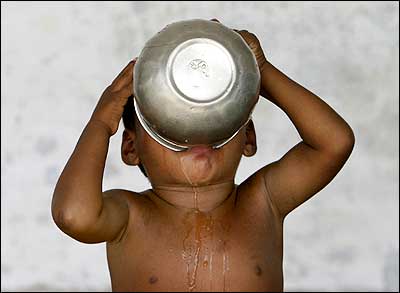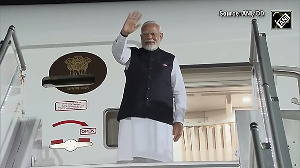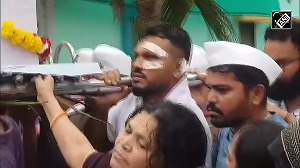 The Manmohan Singh government’s rush to pass the Food Security Bill reflects extreme paucity of logic and action, says Neeta Kolhatkar
The Manmohan Singh government’s rush to pass the Food Security Bill reflects extreme paucity of logic and action, says Neeta Kolhatkar
Considering that our prime minister is someone who has been associated with economic reforms and liberalisation, I would expect he would have taken feedback from the ground and read several reports which are in the public domain regarding the appalling conditions of our food storage and distribution system.
The last few weeks have been disconcerting as to why Dr Manmohan Singh and the United Progressive Alliance government are so keen to pass the National Food Security Bill.
There are innumerable schemes that have existed since, say, Indira Gandhi’s time. If that is too much of a time frame (not more than three decades), we could even consider since Rajiv Gandhi’s time.
Several poverty eradication programmes have existed and by now we should have had no poor, nobody living even under the poverty line as per member of Parliament Raj Babbar’s definition.
Instead, a whole new political drama unfolds over the transfer of a lady IAS officer Durga Nagpal, which incident the UPA 2 has used to ally with the Samajwadi Party and get parliamentary numbers to pass this Bill.
It is an eye-opener to read the Food Security Bill policy document. Everything mentioned in it already exists but is running in the most apathetic manner.
I would have expected common-sense to prevail; this Bill should really have been about ‘protecting’ the food-grains stored, ensuring that our poor get food security for the whole year from the various existing schemes. Instead, we get another Bill on the lines of policies that already exist.
This makes me wonder about the intention of the government.
If it truly believes in eradicating poverty, then this rush to pass the FSB reflects extreme paucity of logic and action.
If the Jan Lokpal Bill was rejected on the grounds that we are creating two parallel oligarchies, same is the case with the FSB.
Last year, we had a record production of food-grains as per the agricultural department. 'Despite inconsistent weather, a record production of 245 million tonnes of foodgrains' was achieved.
With the last two good seasons for food-grains, the government actually recorded 100-110 million tonnes of wheat, which many experts said was enough to feed India’s poor for a whole year. Forget the poor getting these grains, instead the members of Parliament are fighting over the basic definition of poverty!
The first question that needs to be asked is, where did all this food-grain go? Why haven’t they reached the poor?
This points to the fact that there are lapses in the supply chain, lack of proper storage facilities, digitisation of records to know where the flaws or leaks are, and how these food-grains make it to the black market.
In fact, last year, we saw on television the pathetic condition of food-grains storage. The government had been considering offloading 66 lakh tonnes of wheat in the open market, and it could barely manage to offload 30 lakh tonnes in the open market.
The storage conditions are extremely archaic -- temporary, makeshift facilities which are often under open skies, and covered with tarpaulin sheets.
Reports of food-grains rotting are now common. The reason being the amount of grains stored under tarpaulin has been rising. As per the GoI figures, it was 9.4 million tonnes in 2008, 16 million tonnes in 2009 and 17.8 million tonnes in 2010.
Since the last bumper production, reports say a lot more of the grains have rotted. The fact is, we need permanent, hygienic modern storage facilities, for which budgetary provisions, packaging machines, security systems that ensure there is no pilferage, and the right people employed to get these things done before assessing whether we need a new bill at all.
Two important documents that need to be read by all when comparing the points of the new bill to ground realities:
(External link) The Justice Wadhwa commission report on public distribution system.
(External link) The final report and recommendations by the Malnutrition Monitoring Committee (2007-12).
All these points -- poverty, malnourishment, PDS, supply of food-grains -- are one inter-connected vicious cycle.
And Maharashtra has it all!
Maharashtra is a shameful state that leads in the highest number of malnourished children.
The MMC report states, ‘The number of malnourished children are unacceptably high, the budget provisions haven’t been sufficiently utilised and despite the number of schemes, programmes and large expenditure for nutrition, the impact has not been proportionate.'
Justice Wadhwa observed that 'there are multiple complaints from beneficiaries about the quality and quantity of food-grains delivered to them.'
Recently, a city tabloid reported on how the Take Home Rations provided to severely malnourished children apart from the food given to them at the anganwadis are substandard.
Worse still, the report stated that the money for Bachat Gats was not getting cleared for over two months and with no money coming in, the Bachat Gats compromise on the quality and quantity of ingredients.
It is a shame that nobody in the Maharashtra government or at the Centre has even bothered to read these reports.
Two years ago, Justice Wadhwa had said in his report that at the Food Corporation of India depot in Manmad and Jalna in Maharashtra, food-grains that were allotted for primary schools, were being pilfered and at the Yavatmal mid-day meal the rice was not supplied for a fortnight.
He had, in fact, remarked: ‘Non-supply of mid-day meal to little children is a serious matter. It amounts to a criminal act.’
I doubt if we have ever heard of how many officers and politicians have been booked for gross negligence and failure to deliver food supplies to malnourished poor women and children.
In fact, the tabloid even reported on how the GoM was making money in handling charges and getting commission on a scheme that is meant for the poor.
Justice Wadhwa’s report about Mumbai and Maharashtra states, ‘There are serious flaws noticed in the system of PDS in the rest of Maharashtra which result in the diversion of precious food-grains into the black market.’ And for Mumbai city, ‘In fact, the committee had noticed the working of distribution of PDS food-grains in Mumbai region is rather strange and results in a commission of 10 to 15 paise per kg.’
Given inflation, with very passing year these commissions have increased. Worse still, the staff that works in the rationing department are taken on deputation from the revenue department and their tenure is for a short period.
Imagine, this is the condition of a state where the government is of the Congress and its ally the Nationalist Congress Party, and where the ‘clean’ chief minister has yet to eradicate the system of making money from the quota of food-grains meant for the poor!











